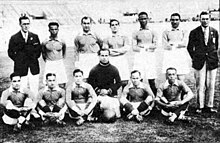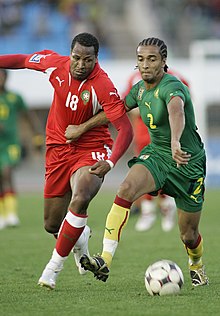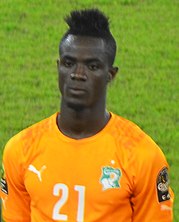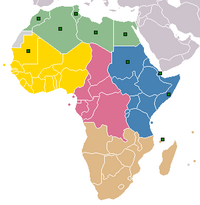Introduction
Football is the most popular sport in Africa. Indeed, football is probably the most popular sport in every African country, although rugby and cricket are also very popular in South Africa. ( Full article...)
This section may be
unbalanced toward certain viewpoints. (October 2022) |

Selected article -
Zamalek Sporting Club ( Arabic: نادي الزمالك للألعاب الرياضية), commonly referred to as Al Zamalek, is an Egyptian sports club based in Giza, Egypt. The club is best known for its professional men's football team, which plays in the Egyptian Premier League, the top tier of the Egyptian football league system. The club is renowned for its consistent success at both domestic and continental levels.
Founded on 5 January 1911 as Qasr El Nile Club, the club has traditionally worn a white home kit since its inception. The club's name was changed two years later to Cairo International Sports Club (Zamalek), colloquially El Qāhirah El Mokhtalat Club or El Mokhtalat Club. In 1941, The club was granted the honorific title after Farouk I and became officially known as Farouk El Awal Club ( transl. Farouk I Club), however, since the 1910s, Zamalek was the club's unofficial name and it became official after the 1952 Egyptian Revolution.
Domestically, Zamalek established itself as one of the two major forces in Egyptian football during the 1920s, as it is the first Egyptian team to ever win a title. Zamalek was the first Egyptian team to win Sultan Hussein Cup in 1921 and 1922, and the first team to win the Egypt Cup in 1922; and the first team to win the Cairo League in 1922–23. It is one of two clubs that have played in every season of the Egyptian Premier League, and one of seven that have never been relegated to the Egyptian Second Division.
Selected biography -
Born in Bingerville, Bailly joined RCD Espanyol's youth system in December 2011, aged 17. He only received a work permit in October of the following year, and made his senior debuts in the 2013–14 campaign with the reserves, in Segunda División B. On 5 October 2014, Bailly made his first-team – and La Liga – debut, coming on as a late substitute in a 2–0 home win against Real Sociedad. He went on to become a first-team regular before signing for Villarreal in January 2015. After a successful season in which the team reached the last four of the 2015–16 UEFA Europa League, he joined Manchester United in June 2016 for a reported £30 million.
He made his international debut for the Ivory Coast in a friendly against Nigeria on 11 January 2015. He appeared in all of his team's six matches at that year's Africa Cup of Nations, helping them to win their second title in the competition's history.
Selected image -
| [[Image:|center|400px|A view of the FNB Stadium after a 2010 FIFA World Cup match]] |
A view of the FNB Stadium after the 2010 FIFA World Cup Group D match between Ghana and Germany on 23 June 2010. Nicknamed Soccer City and the Calabash, the stadium is the largest in Africa with a capacity of 94,736. It is the home ground of South African giants Kaizer Chiefs and the South Africa national team.
Subcategories
Related portals
More sports portals
WikiProjects
Related task forces and sub-projects
African football task force
WikiProject Africa •
WikiProject Football
WikiProject Football task forces and sub-projects
 | |
| Wikipedia ads | file info – #250 |
Topics
Open tasks

- Expand stubs: Competitions in Africa • Organizations
- Expand club articles of teams from Africa.
- Expand biographies of Africans involved in football.
- Create: Requested articles • Most wanted football articles • Requested general football articles
- Add: Infoboxes • Images ( General requests, Requested images of people)
- Review: articles currently under review
- Assess: Assessment requests • Assess an article
- Revert vandalism on this portal and on African football articles
- Assist in maintaining this portal and keeping its selected content up to date.
- WikiNews: Create and submit news stories about African football for Wikipedia's sister project WikiNews.
Associated Wikimedia
The following Wikimedia Foundation sister projects provide more on this subject:
-
Commons
Free media repository -
Wikibooks
Free textbooks and manuals -
Wikidata
Free knowledge base -
Wikinews
Free-content news -
Wikiquote
Collection of quotations -
Wikisource
Free-content library -
Wikiversity
Free learning tools -
Wiktionary
Dictionary and thesaurus
More portals
Sources

- ^ "The History Of Soccer In Africa". NPR.org. 2010-06-09. Retrieved 2016-03-31.
- ^ a b c Alegi, Peter (2010). African Soccerscapes. Ohio University Press. pp. 1–2. ISBN 9780896802780.
- ^ Frimpong, Enoch Darfah. "Ghana news: A world of superstition, frustration and disillusionment - Graphic Online". Retrieved 23 September 2017.
- ^ Lacey, Marc (8 August 2002). "Kangemi Journal; For Spellbinding Soccer, the Juju Man's on the Ball". The New York Times. NY Times. Retrieved 2016-03-31.
- ^ "World Cup Witchcraft: Africa Teams Turn to Magic for Aid". National Geographic. Archived from the original on July 10, 2006. Retrieved 2016-03-31.
- ^ Andy Mitten (September 2010). The Rough Guide to Cult Football. Rough Guides UK. ISBN 9781405387965. Retrieved 2016-04-02.
- ^ "African Nations Cup overshadowed by hocus pocus | Football". The Guardian. Retrieved 2016-04-09.
- ^ Kuper, Simon (2006). Soccer Against the Enemy: How the World's Most Popular Sport Starts and Stops Wars, Fuels Revolutions, and Keeps Dictators in Power. Nation Books. p. 123. ISBN 978-1-56025-878-0.
Introduction
Football is the most popular sport in Africa. Indeed, football is probably the most popular sport in every African country, although rugby and cricket are also very popular in South Africa. ( Full article...)
This section may be
unbalanced toward certain viewpoints. (October 2022) |

Selected article -
Zamalek Sporting Club ( Arabic: نادي الزمالك للألعاب الرياضية), commonly referred to as Al Zamalek, is an Egyptian sports club based in Giza, Egypt. The club is best known for its professional men's football team, which plays in the Egyptian Premier League, the top tier of the Egyptian football league system. The club is renowned for its consistent success at both domestic and continental levels.
Founded on 5 January 1911 as Qasr El Nile Club, the club has traditionally worn a white home kit since its inception. The club's name was changed two years later to Cairo International Sports Club (Zamalek), colloquially El Qāhirah El Mokhtalat Club or El Mokhtalat Club. In 1941, The club was granted the honorific title after Farouk I and became officially known as Farouk El Awal Club ( transl. Farouk I Club), however, since the 1910s, Zamalek was the club's unofficial name and it became official after the 1952 Egyptian Revolution.
Domestically, Zamalek established itself as one of the two major forces in Egyptian football during the 1920s, as it is the first Egyptian team to ever win a title. Zamalek was the first Egyptian team to win Sultan Hussein Cup in 1921 and 1922, and the first team to win the Egypt Cup in 1922; and the first team to win the Cairo League in 1922–23. It is one of two clubs that have played in every season of the Egyptian Premier League, and one of seven that have never been relegated to the Egyptian Second Division.
Selected biography -
Born in Bingerville, Bailly joined RCD Espanyol's youth system in December 2011, aged 17. He only received a work permit in October of the following year, and made his senior debuts in the 2013–14 campaign with the reserves, in Segunda División B. On 5 October 2014, Bailly made his first-team – and La Liga – debut, coming on as a late substitute in a 2–0 home win against Real Sociedad. He went on to become a first-team regular before signing for Villarreal in January 2015. After a successful season in which the team reached the last four of the 2015–16 UEFA Europa League, he joined Manchester United in June 2016 for a reported £30 million.
He made his international debut for the Ivory Coast in a friendly against Nigeria on 11 January 2015. He appeared in all of his team's six matches at that year's Africa Cup of Nations, helping them to win their second title in the competition's history.
Selected image -
| [[Image:|center|400px|A view of the FNB Stadium after a 2010 FIFA World Cup match]] |
A view of the FNB Stadium after the 2010 FIFA World Cup Group D match between Ghana and Germany on 23 June 2010. Nicknamed Soccer City and the Calabash, the stadium is the largest in Africa with a capacity of 94,736. It is the home ground of South African giants Kaizer Chiefs and the South Africa national team.
Subcategories
Related portals
More sports portals
WikiProjects
Related task forces and sub-projects
African football task force
WikiProject Africa •
WikiProject Football
WikiProject Football task forces and sub-projects
 | |
| Wikipedia ads | file info – #250 |
Topics
Open tasks

- Expand stubs: Competitions in Africa • Organizations
- Expand club articles of teams from Africa.
- Expand biographies of Africans involved in football.
- Create: Requested articles • Most wanted football articles • Requested general football articles
- Add: Infoboxes • Images ( General requests, Requested images of people)
- Review: articles currently under review
- Assess: Assessment requests • Assess an article
- Revert vandalism on this portal and on African football articles
- Assist in maintaining this portal and keeping its selected content up to date.
- WikiNews: Create and submit news stories about African football for Wikipedia's sister project WikiNews.
Associated Wikimedia
The following Wikimedia Foundation sister projects provide more on this subject:
-
Commons
Free media repository -
Wikibooks
Free textbooks and manuals -
Wikidata
Free knowledge base -
Wikinews
Free-content news -
Wikiquote
Collection of quotations -
Wikisource
Free-content library -
Wikiversity
Free learning tools -
Wiktionary
Dictionary and thesaurus
More portals
Sources

- ^ "The History Of Soccer In Africa". NPR.org. 2010-06-09. Retrieved 2016-03-31.
- ^ a b c Alegi, Peter (2010). African Soccerscapes. Ohio University Press. pp. 1–2. ISBN 9780896802780.
- ^ Frimpong, Enoch Darfah. "Ghana news: A world of superstition, frustration and disillusionment - Graphic Online". Retrieved 23 September 2017.
- ^ Lacey, Marc (8 August 2002). "Kangemi Journal; For Spellbinding Soccer, the Juju Man's on the Ball". The New York Times. NY Times. Retrieved 2016-03-31.
- ^ "World Cup Witchcraft: Africa Teams Turn to Magic for Aid". National Geographic. Archived from the original on July 10, 2006. Retrieved 2016-03-31.
- ^ Andy Mitten (September 2010). The Rough Guide to Cult Football. Rough Guides UK. ISBN 9781405387965. Retrieved 2016-04-02.
- ^ "African Nations Cup overshadowed by hocus pocus | Football". The Guardian. Retrieved 2016-04-09.
- ^ Kuper, Simon (2006). Soccer Against the Enemy: How the World's Most Popular Sport Starts and Stops Wars, Fuels Revolutions, and Keeps Dictators in Power. Nation Books. p. 123. ISBN 978-1-56025-878-0.
























